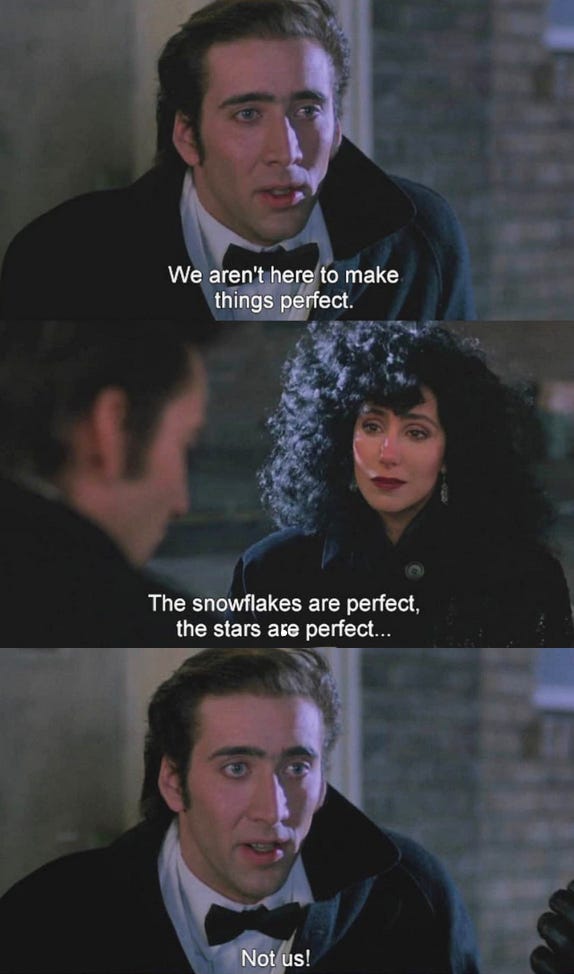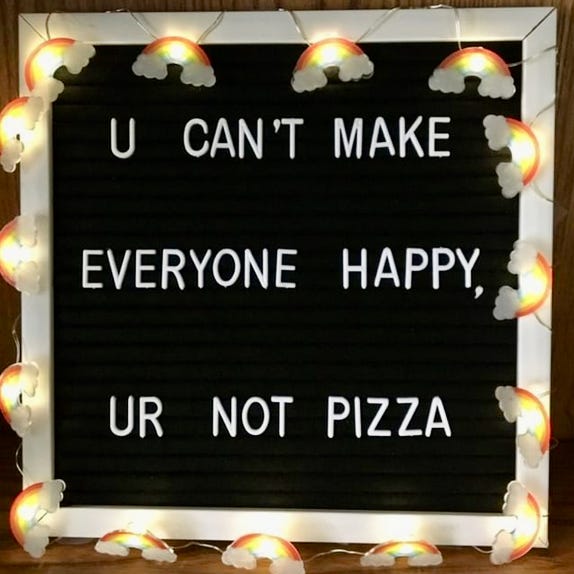The Myth Of The ‘Undeniable’ Spec Script
My debut spec screenplay was optioned by a Golden Globe-winning producer, and later Oscar-nominated actors were attached. Was it ‘undeniable’? No.
Screenwriting bros (who are like screenwriting gurus, but spend more of their time on social media) are fond of saying, well, many things. Some of which I agree with (eg ‘link your story beats through cause and effect’), others (eg ‘never put songs in your scripts, are you CRAZY you total AMATEUR’) less so.
Into the latter category falls one piece of received wisdom about spec scripts which always has my eyes rolling so far back in my head that... well, according to Google’s AI answer, I’d have to seek help for nystagmus. (Google AI isn’t very good at expressions. Or much else, to be honest. But I digress.)
Spec scripts – ie a screenplay you’ve written speculatively, as opposed to having been hired to write it – are the scripts that often launch us writers into the film/TV world. They’re the ones we’ve crafted (usually) on our own, in our own time, for free – with a hope that they will then get attention/be produced/serve as a calling card script. Or hopefully all three.
And the piece of screenwriting/industry advice about spec scripts that really gets my goat (I’m not going near Google AI with that one) is this:
'Your spec script has to be undeniable.’
Now, I’ve been lucky enough to have two spec screenplays taken on by producers – the first one did indeed launch my career (and has served as a calling card script); the second was a movie musical I wrote a few years later.
I can tell you right now that neither was ‘undeniable’. Indeed, both of them were very much denied by various producers.
So my dear writer friends, please don't tie yourself up in knots thinking your spec script – or manuscript, or other piece of work that's going out in the world – has to be 'undeniable'. In the spirit of a three-act structure (I tend to agree with the screenwriting bros on that, tbf), here are three reasons why I think this particular piece of advice is one that writers can cheerfully ignore. Which is always the best way to ignore things, I find…
1. There’s no such thing as ‘undeniable’
Your script doesn’t have to be ‘undeniable’ because, guess what? It can’t be!
'Undeniable' is the black-and-white language of absolutes – and I don't believe absolutes are helpful or even necessarily true when it comes to the messiness of creativity and the craft of writing, or any other artistic pursuit.
No piece of art is undeniable because, like the humans that create it (god willing), no piece of art is perfect. The snowflakes, the stars... yes. But not us, Loretta. And not the art we create.
In short, aiming for ‘undeniability’ is like aiming for perfection: it doesn’t exist in art, and the pursuit of it is the enemy of creativity. Or at least one of its enemies (other enemies coming soon in future posts!).
Do I believe that some scripts can, objectively, be described as ‘well-written’? Yes. Do I believe that some scripts are better written than others? Also yes.
But do I believe a script can be 100%, cast-iron, copper-bottomed ‘undeniable’? No. Because although it may speak to one person, it may not speak to another. And in the end, whether a screenplay moves us in some way emotionally – or even leads us to admire it intellectually – is largely down to subjectivity, aka:
2. Who’s to say it’s undeniable?
There are plenty of films and TV shows that people – including critics – have loved that I don’t, and vice versa (eg The White Lotus season 3. That's in the 'vice versa' category, btw). There are plenty of pieces of art that move other people, but may not move you.
The person reading your script has their own tastes, interests and values – which may or may not chime with yours. Whether you or they realise it consciously or not, they bring all their life experience on this planet thus far to the table when they’re reading a script – just as do you when you’re writing it – and that affects whether they connect with it.
As a result, plenty of successful and beloved screenplays and novels were 'denied' along the way by plenty of people. It's a tale as old as time! (Speaking of which: did you know there were two unsuccessful attempts to adapt Beauty And The Beast back in the day?).
Put it this way. My first spec screenplay went out to three producers: one never got back to us, one did but didn’t like/get it, the third one went for it instantly and optioned it. My second spec screenplay went out to multiple producers and nobody wanted it – until my agent got it to two brilliant women who loved it, absolutely got it, and signed a shopping agreement for it.
Or to put it another way:
3. Your script doesn’t need to be 'undeniable'. It doesn’t even need to be great. It just needs to be good enough.
We’ve already established that your spec script can’t be perfect, because no piece of art is. Should you try and make it great? Yes. Will it be? Maybe, maybe not. Does that matter, if it's true to you and your POV on life, and you’ve told a story/created a world that the reader finds engaging/authentic/moving? Not really, no.
Because any reader worth their salt will know that your spec script is a starting point – not the finished item – and if you've done the above, you've created a cracking good starting point. You've also set out your stall for what kind of writer you are, and what kind of stories you want to tell – and thus created a cracking good calling card.
So yes, you do have to try and make your spec script as good as you can. Which includes rewriting and reworking it for as long as it needs, and doing all the hard graft that a cracking script takes.
But do you have to make it ‘undeniable’? No. Because you can’t. (See 1.)





